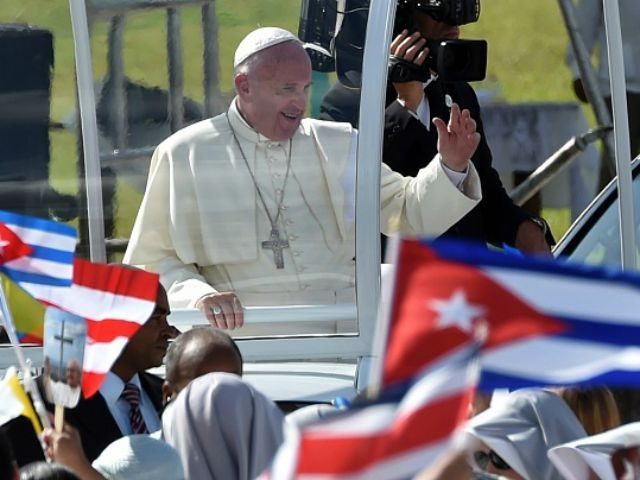Over and over again during his four day visit to Cuba, Pope Francis drew attention away from the Castro Revolution of 1958 to the deeper Christian roots of the Cuban nation.
In a pointed dig at Castro’s atheistic Marxism, Francis said that the country’s founders intended Cuba to be a Christian nation.
At the welcoming ceremony at the José Martí airport Saturday, Francis gazed further back than the 1958 revolution, to the birth of Cuba as a nation through its 1895-1898 war of independence from Spain. Francis said that “the veterans of the War of Independence” were “moved by sentiments of faith and patriotism” and wanted the Virgin Mary to be “the patroness of Cuba as a free and sovereign nation.”
And in his homily at Mass on Tuesday morning at the Shrine of Our Lady of Charity of El Cobre, Pope Francis held up a different revolution as the goal of the Cuban people, a spiritual revolution in imitation of the Virgin Mary.
In his homily, the Pope used rhetoric familiar to the Cuban people, with a spin they hadn’t heard before. The real revolution, Francis suggested, is not the Castro Revolution, but an interior revolution. “We are invited to live the revolution of tenderness, like Mary, the Mother of God,” Francis said, which is lived out through closeness, compassion and service.
It is Mary, Francis said, who “watches over our roots, our identity, so we don’t get lost in paths of despair. The soul of the Cuban people was forged among sorrows and privations that were not able to extinguish the faith,” he said.
Cuba was not born of the 1958 revolution, Francis suggested, proposing instead that it was “born and grew under Mary the mother of charity.”
This is not the first time Francis has criticized the Castros. In a little known book he published in 1998, then-Archbishop Jorge Bergoglio wrote a commentary on Pope John Paul’s visit to the Island, stating that the Castro’s “authoritarian” and “corrupt” regime needed to be dissolved.
Last week, in a virtual meeting with Cuban youth, the Pope urged them to beware of “dictators” and “tyrants” who struggle to hold onto power.
A good leader, Francis told them, “is the one who is able to beget other leaders. If a leader wants to stay in power, he is a tyrant. True leadership is fruitful.”
In pointed political language, the Pope told the youth that “today’s leaders won’t be there tomorrow. If they don’t sow the seed of leadership in others, they are worthless. They are dictators.”
And in his first Mass on Cuban soil Sunday, Francis also rejected the Marxist idea of class struggle, telling the thousands in attendance that Jesus is for everyone.
This was vintage Francis, the Pope who has come to be known for his insistence on mercy—God’s mercy toward man, and people’s mercy toward one other.
“Service is never ideological, for we do not serve ideas, we serve people,” he said.
Follow Thomas D. Williams on Twitter @tdwilliamsrome

COMMENTS
Please let us know if you're having issues with commenting.